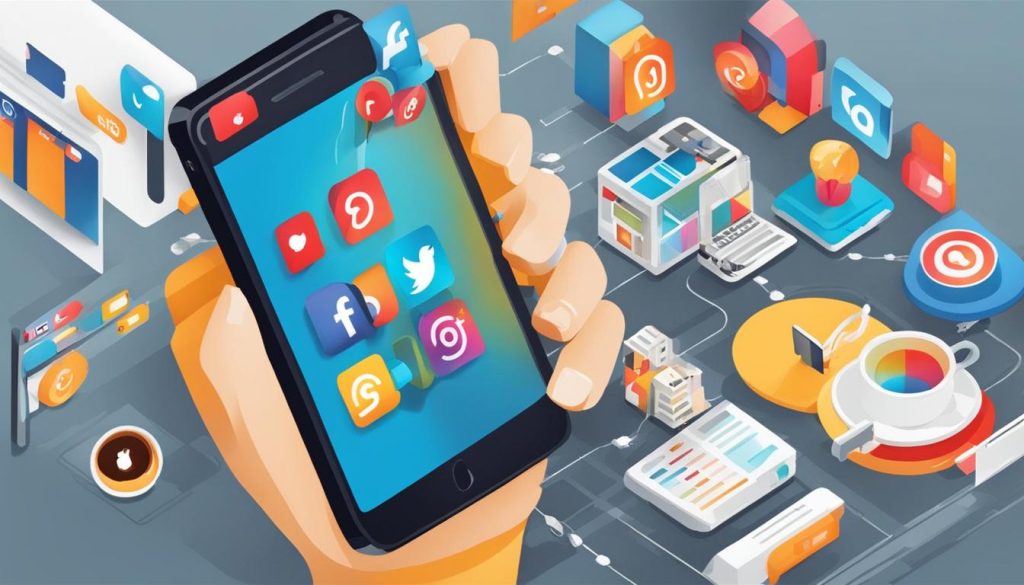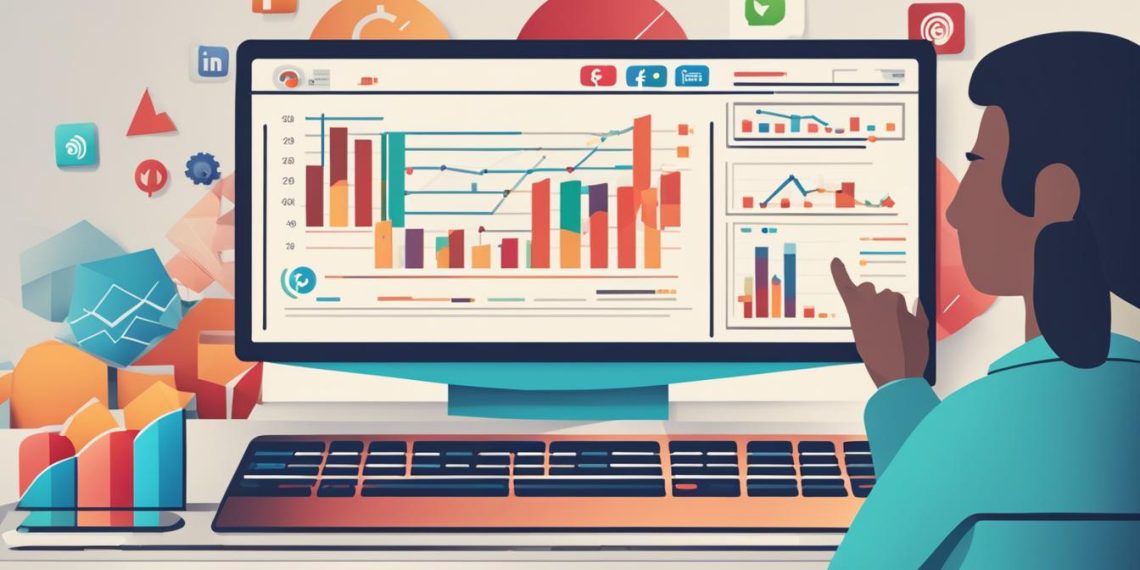Social media turned digital marketing upside down. Imagine sharpening your ads to show off your brand to a huge crowd. That’s the magic of **social media marketing** – it transforms how businesses get noticed and grow. When you boost your social media game and **see your digital footprint grow**, you’ll definitely see better results. This chat dives into how **social media boosts your digital marketing moves** and the big pluses it offers your biz. Keep reading to learn why throwing social media into your mix might be the smart play your company is searching for.
Key Takeaways:
- Social media is a game-changer in digital marketing, providing opportunities to enhance brand visibility and reach.
- Optimizing social media presence and tracking digital marketing effectiveness metrics are crucial for success.
- Social media campaigns enable businesses to engage with their target audience and drive meaningful interactions.
- Effective digital marketing tactics on social media include influencer marketing and user-generated content.
- Utilizing social media analytics helps in improving social media engagement and refining digital marketing strategies.
How Social Media Enhances Digital Marketing Strategies
Social media plays a pivotal role in enhancing digital marketing strategies. Its impact extends beyond traditional marketing channels, offering businesses numerous opportunities to optimize their online presence and drive results. By leveraging social media, businesses can enhance brand visibility and reach, implement targeted advertising campaigns, engage with customers in real-time, leverage influencer marketing, promote user-generated content, and gain invaluable insights through comprehensive data analytics.
Increased Brand Visibility and Reach
One of the key ways social media enhances digital marketing strategies is by increasing brand visibility and reach. Platforms like Facebook, Instagram, Twitter, and LinkedIn have billions of daily active users, providing businesses with a vast audience to connect with. By creating compelling content and actively engaging with followers, businesses can expand their brand’s reach beyond immediate networks. Sharing content instantaneously fosters word-of-mouth marketing and allows brands to tap into the power of social sharing. This wider reach increases brand awareness and exposure to potential customers.
Targeted Advertising Options
Social media platforms excel in providing businesses with targeted advertising options. Advanced algorithms enable businesses to specify their desired audience based on user behavior, interests, demographics, and preferences. By precisely targeting the most relevant audience, businesses can optimize their advertising budget and increase the likelihood of conversion. Social media’s granular targeting options allow businesses to tailor their campaigns to specific segments, ensuring their messaging resonates with the right people.
Real-Time Customer Interaction
Social media facilitates real-time customer interaction, setting it apart from traditional marketing channels. Businesses can directly communicate with customers, providing support, addressing concerns, and gathering valuable feedback. This immediate avenue for interaction cultivates trust, builds lasting relationships, and enhances customer satisfaction. With social media, businesses can address customer queries promptly, ensuring a seamless experience and demonstrating their commitment to customer care.
Facilitating Influencer Marketing
Influencer marketing has gained significant traction in recent years, and social media platforms have played a pivotal role in its success. By partnering with influencers, businesses can tap into their established reach, credibility, and expertise to promote their products or services. Influencers have built a loyal following, often consisting of highly engaged and relevant audiences. Leveraging influencer marketing allows businesses to expand their reach to a targeted group of potential customers, leveraging the influencer’s authority and influence to drive brand exposure.
Promoting User-Generated Content
Social media platforms are an ideal channel for promoting user-generated content (UGC). UGC refers to content created and shared by customers, showcasing their positive experiences with a brand or its products. This type of content serves as social proof, building trust among potential customers and influencing their purchasing decisions. By encouraging and featuring user-generated content, businesses can amplify their brand messaging, engage their audience, and foster a sense of community and loyalty.
Comprehensive Data Analytics and Insights
Social media platforms provide businesses with comprehensive data analytics and insights, enabling them to measure the effectiveness of their digital marketing strategies. Through social media analytics, businesses can track key performance indicators, analyze engagement rates, reach, and conversion metrics, and gain valuable insights into their target audience. This data-driven approach allows businesses to refine their strategies, make data-backed decisions, and optimize their digital marketing efforts for better results.
“Social media enhances digital marketing strategies by increasing brand visibility and reach, providing targeted advertising options, enabling real-time customer interaction, facilitating influencer marketing, promoting user-generated content, and offering comprehensive data analytics and insights.”
| Benefits | Explanation |
|---|---|
| Increased Brand Visibility and Reach | Expands brand reach beyond immediate networks through social sharing and word-of-mouth marketing |
| Targeted Advertising Options | Precisely target the most relevant audience based on demographics, interests, and behaviors |
| Real-Time Customer Interaction | Provides an immediate avenue for businesses to communicate with customers, address concerns, and gather feedback |
| Facilitating Influencer Marketing | Tap into established influencers’ reach, credibility, and authority to promote products or services |
| Promoting User-Generated Content | Leverage positive user experiences to build trust, engage the audience, and showcase social proof |
| Comprehensive Data Analytics and Insights | Measure the effectiveness of digital marketing strategies and optimize based on data-driven decisions |
Benefits of Social Media in Digital Marketing
Social media plays a crucial role in digital marketing, offering a wide range of benefits for businesses. By leveraging social media platforms effectively, you can enhance your marketing strategies and achieve significant results. Let’s explore some of the key advantages of incorporating social media into your digital marketing efforts:
Increased Brand Awareness
One of the primary benefits of social media in digital marketing is the ability to increase brand awareness. With billions of users active on platforms like Facebook, Instagram, Twitter, and LinkedIn, social media provides a vast audience to showcase your brand. Through engaging content and strategic marketing campaigns, you can reach new audiences, expand your brand’s reach, and boost brand recognition.
Enhanced Customer Engagement
Social media platforms provide an interactive and immediate means for businesses to engage with their customers. By leveraging social media channels, you can initiate real-time conversations, address customer concerns, and provide personalized support. This level of engagement fosters customer loyalty, builds trust, and strengthens relationships, ultimately leading to repeat business and word-of-mouth referrals.
Targeted Advertising Options
Social media platforms offer sophisticated targeting capabilities that allow businesses to showcase their ads to specific audiences. With detailed demographic information and user behavior data, you can narrow down your target audience and ensure that your ads reach the most relevant people. This targeted approach increases the chances of generating quality leads, improving conversion rates, and maximizing your return on investment (ROI).
Cost-Effective Marketing Solutions
Compared to traditional marketing channels, social media provides cost-effective marketing solutions. Advertising on social media platforms is often more affordable than traditional advertising methods, making it accessible even to businesses with limited budgets. Additionally, the ability to track and analyze the performance of your social media campaigns allows you to optimize your strategy, making the most out of your marketing budget.
Drive Website Traffic and Generate Leads
Social media serves as an effective tool for driving traffic to your website and generating leads. By sharing valuable content, promotional offers, and engaging with your audience, you can direct users to your website, where they can learn more about your products or services and potentially convert into customers. Social media also facilitates lead generation through lead capture forms, enabling you to collect valuable contact information for further marketing efforts.
| Benefits of Social Media in Digital Marketing | |
|---|---|
| Increased brand awareness | Engaged customer base |
| Targeted advertising options | Cost-effective marketing solutions |
| Drive website traffic | Generate leads and customers |
By harnessing the power of social media in your digital marketing strategy, you can unlock these benefits and more. The ability to connect with your target audience, build brand visibility, and drive measurable results makes social media an indispensable tool for businesses in today’s digital landscape.
The Power of Social Media
Social media platforms like Facebook, Instagram, Twitter, and LinkedIn have revolutionized the way businesses reach their target audience. With billions of daily users, these platforms have become powerful tools for businesses to promote their products or services and increase brand awareness. The widespread usage of social media presents immense potential for businesses to establish a strong online presence and expand their customer base.
Social media’s influence in digital marketing cannot be underestimated. It offers businesses several advantages, such as:
- Increased Reach: Social media allows businesses to extend their reach to a vast audience across different demographics and geographical locations. By leveraging these platforms, companies can engage with potential customers who may have never been exposed to their brand otherwise.
- Targeted Advertising: With advanced targeting options, social media platforms enable businesses to display their ads to specific audiences based on demographics, interests, and behavior. This precise targeting ensures that promotional content is seen by the most relevant individuals, increasing the likelihood of conversions.
- Real-Time Customer Interaction: Social media provides an immediate and direct channel for businesses to interact with customers, allowing them to address questions, provide support, and gather feedback in real-time. This engagement fosters trust and loyalty, strengthening customer relationships.
- Influencer Marketing: Collaborating with influencers on social media allows businesses to tap into their large and engaged following. Through influencer partnerships, companies can leverage the credibility and reach of these individuals to promote their products or services, effectively expanding their brand’s visibility and credibility.
- User-Generated Content: Social media encourages users to create and share content related to brands and products. Businesses can leverage user-generated content (UGC) to build social proof and trust among potential customers. UGC showcases real experiences and endorsements, helping to enhance brand credibility.

Social media has transformed the way businesses approach digital marketing. It provides unparalleled opportunities for brand visibility, targeted advertising, real-time customer interaction, influencer partnerships, and leveraging user-generated content. With the right strategies and tactics, businesses can harness the power of social media to connect with their audience and achieve remarkable growth.
To illustrate the impact of social media on businesses, let’s take a closer look at the following table, which highlights the number of daily active users on popular social media platforms:
| Social Media Platform | Daily Active Users (in billions) |
|---|---|
| 2.8 | |
| 1.2 | |
| 0.330 | |
| 0.294 |
The table clearly demonstrates the massive user base that social media platforms have. Businesses can leverage these platforms to reach a substantial audience, allowing them to increase brand visibility and connect with potential customers on a large scale.
Social media’s power in digital marketing is undeniable. The ability to reach billions of users, precisely target advertising, engage in real-time with customers, leverage influencers, and harness user-generated content makes it an essential tool for businesses looking to thrive in today’s digital landscape.
Increased Brand Visibility and Reach
Social media presents businesses with an unprecedented opportunity to increase their brand visibility and reach a wide audience with minimal effort. By leveraging social media platforms, businesses can create compelling content and engage with their followers to enhance their online presence and expand their brand’s reach beyond immediate networks.
The ability to share content instantaneously on social media facilitates word-of-mouth marketing, which is one of the most powerful forms of advertising. When your followers engage with your content and share it with their own networks, it introduces your brand to new audiences who may not have been previously aware of your products or services. This organic sharing not only increases your brand’s visibility but also enhances its credibility and trustworthiness in the eyes of potential customers.
Through consistent and strategic social media efforts, businesses can establish themselves as industry leaders and actively participate in relevant conversations within their target market. By providing valuable insights, thought-provoking content, and timely responses to customer inquiries or comments, you can position your brand as a trusted source of information and build a loyal customer base.
“By leveraging social media platforms, businesses can create compelling content and engage with their followers to enhance their online presence and expand their brand’s reach beyond immediate networks.”
Furthermore, social media platforms offer a variety of features and tools that enable businesses to amplify their reach. For example, utilizing relevant hashtags and geotags can attract users who are interested in specific topics or located in specific regions, increasing the visibility of your content to your target audience. Additionally, social media advertising options allow businesses to precisely target their desired demographic, ensuring that their content reaches the most relevant audience.
Overall, integrating social media into your digital marketing strategy can significantly boost your brand’s visibility and expand your reach. By creating compelling content, engaging with your followers, and leveraging the power of social sharing, you can increase brand recognition and attract new customers. Furthermore, with the availability of comprehensive analytics and insights provided by social media platforms, you can continuously refine and optimize your strategies to maximize the impact of your online presence.
Targeted Advertising
In today’s digital age, targeted advertising has revolutionized the way businesses reach their desired audiences. Social media platforms have harnessed the power of advanced algorithms, enabling businesses to target specific demographics based on user behavior, interests, and preferences. This precision targeting ensures that ads are served to the most relevant audience, increasing the likelihood of conversion and maximizing Return on Investment (ROI).
With targeted advertising on social media, businesses can focus their marketing efforts on individuals who are most likely to be interested in their products or services. By tailoring ads to match the preferences and needs of these specific demographics, businesses can optimize their marketing campaigns and drive more relevant traffic to their websites.
One of the key advantages of targeted advertising on social media is the ability to reach niche markets that may be otherwise difficult to access through traditional advertising channels. Whether it’s targeting a specific age group, geographic location, or interest-based community, social media platforms provide businesses with the tools to refine their audience targeting and ensure their ads are shown to the right people at the right time.
“Targeted advertising on social media allows businesses to make the most of their marketing budgets by focusing their efforts on high-value audiences. By delivering personalized content to the right people, businesses can increase engagement and drive conversions.”
The ability to measure and track the effectiveness of targeted advertising is another advantage offered by social media platforms. With robust analytics and reporting tools, businesses can gain valuable insights into the performance of their ads, including reach, engagement, click-through rates, and conversions. This data-driven approach empowers businesses to optimize their advertising strategies and make informed decisions to enhance their marketing efforts.
Targeted advertising on social media goes beyond simply displaying relevant ads. It enables businesses to connect with their audience on a deeper level by leveraging user data and preferences. By understanding the interests and behaviors of their target audience, businesses can create personalized ads that resonate with their customers, increasing the chances of engagement and conversion.
The Benefits of Targeted Advertising on Social Media:
- Higher conversion rates due to increased relevance and personalization
- Efficient allocation of marketing budget by focusing on high-value audiences
- Improved customer engagement through tailored content
- Access to niche markets that are difficult to reach through traditional channels
- Data-driven insights for optimizing advertising strategies
Ultimately, targeted advertising on social media offers businesses a powerful tool to enhance their marketing efforts and achieve meaningful results. By leveraging advanced algorithms and user data, businesses can connect with their target audience in a more personalized way, boosting engagement and driving conversions.
Real-Time Customer Interaction
Social media has revolutionized customer interaction by providing businesses with a direct and immediate avenue to connect with their customers in real-time. Unlike traditional marketing channels, social media platforms enable businesses to engage with customers, address their concerns, provide support, and gather valuable feedback instantly. This real-time communication creates a unique opportunity for businesses to build trust, foster relationships, and deliver exceptional customer experiences.
Through real-time customer interaction on social media, businesses can respond promptly to inquiries, resolve issues, and provide personalized support. This level of responsiveness not only showcases a company’s commitment to customer satisfaction but also enhances the overall customer experience. By actively engaging with customers in real-time, businesses can demonstrate their attentiveness and dedication, which can go a long way in establishing a positive brand image and loyalty.
Social media platforms also allow businesses to proactively seek feedback from customers, helping them understand customer preferences, pain points, and expectations better. This valuable feedback can be used to refine products or services, improve customer satisfaction, and identify areas for growth and innovation. Additionally, by actively listening to customer feedback and addressing their concerns promptly, businesses can showcase their commitment to customer-centricity and build a loyal customer base.
“Social media’s real-time customer interaction capabilities provide businesses with an invaluable opportunity to directly engage with their customers, address their needs, and foster long-term relationships built on trust and exceptional customer service.”
Moreover, real-time customer interaction on social media enables businesses to humanize their brand by adding a personal touch. By engaging in genuine, authentic conversations, businesses can establish an emotional connection with their customers and create a sense of community. This personalization contributes to brand loyalty and repeat business, as customers feel more valued and connected to the brand.
Benefits of Real-Time Customer Interaction on Social Media:
- Immediate addressal of customer concerns and inquiries
- Proactive gathering of valuable customer feedback
- Building trust, brand loyalty, and customer satisfaction
- Personalized support and assistance
- Establishing a strong brand image
- Enhancing customer experience and engagement
Real-time customer interaction on social media truly empowers businesses to provide exceptional customer service, listen to their customers, and create meaningful connections. By embracing this invaluable feature, businesses can leverage the power of real-time communication to strengthen their brand, build lasting customer relationships, and drive business growth.

Influencer Marketing
In today’s digital landscape, influencer marketing has emerged as a powerful strategy for businesses to connect with their target audience and drive brand awareness. Leveraging the popularity and credibility of social media influencers, businesses can tap into their large following and expand their reach to a highly targeted group of potential customers.
Partnering with influencers allows businesses to benefit from their established online presence and engage with consumers in an authentic and relatable way. By collaborating with influencers who align with their brand values and target demographics, businesses can create impactful content that resonates with their audience.
The Power of Influence
One of the primary advantages of influencer marketing is the ability to leverage the power of influence. Social media influencers have cultivated dedicated communities of followers who trust their recommendations and opinions. This trust translates into increased brand credibility and drives purchase decisions among their followers.
When influencers endorse a product or service, their audience perceives it as a genuine recommendation rather than a traditional advertisement. This personal touch and authentic connection lead to higher engagement levels and improved conversion rates.
Targeting the Right Audience
Influencer marketing allows businesses to reach specific target demographics with precision. By partnering with influencers who have a following that aligns with their target market, businesses can ensure that their message is delivered to the right audience.
For example, if a fitness apparel brand wants to target fitness enthusiasts, they can collaborate with influencers who specialize in health and fitness content. This collaboration not only ensures that the brand’s message reaches fitness-minded individuals but also establishes credibility within the industry.
Measuring Success
One of the key advantages of influencer marketing is the ability to measure the success of campaigns through various performance metrics. By leveraging social media analytics tools, businesses can track key performance indicators such as reach, engagement, clicks, and conversions.
This data allows businesses to evaluate the effectiveness of influencer partnerships and make informed decisions for future collaborations. Through continuous analysis and optimization, businesses can refine their influencer marketing strategies to maximize ROI and achieve tangible results.
| Benefits of Influencer Marketing | Key Takeaways |
|---|---|
|
|
User-Generated Content
Social media is a powerful platform that encourages users to become active participants in content creation. Through user-generated content campaigns, brands can harness the creativity and enthusiasm of their audience to amplify their message and build trust among potential customers.
User-generated content refers to any form of content, such as photos, videos, testimonials, reviews, or comments, created and shared by users about a brand or its products. This content holds immense value as it reflects genuine experiences, opinions, and perspectives.
When users share positive experiences with a brand or its products, it serves as social proof for others who are considering making a purchase. According to a study by Nielsen, 92% of consumers trust recommendations from friends and family over other forms of advertising. By leveraging user-generated content, brands can tap into the power of social proof and build trust.
The Benefits of User-Generated Content
User-generated content offers several key benefits for businesses:
- Authenticity: User-generated content is seen as more authentic and trustworthy compared to branded content. It provides a genuine glimpse into the experiences and satisfaction levels of real customers, fostering credibility for the brand.
- Engagement: Encouraging users to create and share content generates higher engagement levels and strengthens the connection between the brand and its audience. It allows customers to actively participate in the brand narrative, creating a sense of community and loyalty.
- Reach: User-generated content has the potential to reach a wider audience beyond the brand’s immediate networks. When users share their content, it can quickly spread across social media platforms, expanding the brand’s visibility.
- Cost-effective: User-generated content is a cost-effective marketing strategy. Brands can leverage the creativity and advocacy of their customers without investing significant resources in content creation. This reduces the burden on the brand’s marketing budget while still achieving impactful results.
Overall, user-generated content is a valuable asset for brands aiming to generate buzz, build trust, and foster strong customer relationships. By embracing and promoting user-generated content, businesses can harness the power of their loyal customers to enhance their digital marketing efforts.
Case Study: GoPro’s User-Generated Content Success
“GoPro has become the go-to brand for adventure enthusiasts and content creators. Through their innovative cameras and user-generated content campaigns, they have built a community of passionate users who actively share their exhilarating experiences. This user-generated content not only showcases the capabilities of the GoPro cameras but also inspires others to push their limits and explore new adventures.”
| Key Metrics | Before User-Generated Content Campaign | After User-Generated Content Campaign |
|---|---|---|
| Brand Mentions | 1,000 | 10,000 |
| Social Media Shares | 100,000 | 1,000,000 |
| Website Traffic | 10,000 monthly visitors | 100,000 monthly visitors |
| Sales | 1,000 units | 10,000 units |
In the case of GoPro, their user-generated content campaigns significantly amplified brand awareness, increased website traffic, and drove sales. By leveraging the passion of their customers, GoPro successfully harnessed the power of user-generated content to build a strong and engaged community.
Data Analytics and Insights
Social media platforms provide businesses with a wealth of data analytics and insights, enabling them to gain a deeper understanding of their marketing efforts. By leveraging these analytics, businesses can make informed decisions, optimize their strategies, and drive better results. Here, we explore how data analytics and insights can be used to measure and improve the effectiveness of your social media marketing campaigns.
Tracking Key Performance Indicators
One of the primary benefits of data analytics is the ability to track key performance indicators (KPIs). These KPIs provide valuable insights into the success of your social media campaigns. Common KPIs include engagement rate, reach, conversion rate, click-through rate, and customer acquisition cost. By monitoring these metrics, businesses can identify trends, understand audience behavior, and make data-driven decisions to optimize their campaigns.
Analyzing Engagement Metrics
Engagement metrics are crucial for measuring the impact of your social media efforts. These metrics include likes, comments, shares, and mentions. By analyzing these metrics, businesses can determine the level of audience interaction with their content and identify what resonates with their target audience. Understanding engagement trends helps businesses refine their content strategy and create more engaging and relevant posts.
Tracking Reach and Impressions
Reach and impressions are essential metrics for assessing the visibility of your social media content. Reach refers to the number of unique users who have seen your post, while impressions represent the total number of times your post has been displayed. By monitoring these metrics, businesses can evaluate the effectiveness of their content distribution strategy and identify opportunities for expanding their reach to a wider audience.
Refining Conversion Strategies
Conversion tracking is essential for measuring the impact of social media on your bottom line. By setting up conversion tracking, businesses can attribute conversions, such as website visits, form submissions, or purchases, back to specific social media campaigns. This data allows businesses to identify which campaigns are driving the most conversions and optimize their strategies accordingly.
“Data analytics is the key to unlocking valuable insights and optimizing social media campaigns for maximum impact.”
By analyzing data analytics and insights, businesses can refine their social media strategies, better understand their audience, improve engagement, reach more customers, and drive conversions. It’s important to regularly review and analyze the available data to identify trends, make data-driven decisions, and stay ahead of the competition.
| Metrics | Definition |
|---|---|
| Engagement Rate | The percentage of people who interact with your content |
| Reach | The number of unique users who see your posts |
| Impressions | The total number of times your posts are displayed |
| Conversion Rate | The percentage of users who complete a desired action |
| Click-Through Rate | The percentage of users who click on a link in your post |
| Customer Acquisition Cost | The cost associated with acquiring a new customer through social media |
Conclusion
In today’s digital landscape, social media has revolutionized the way businesses market themselves. With its undeniable impact on digital marketing strategies, social media offers a multitude of opportunities for businesses to enhance their brand visibility, engage with customers in real-time, drive targeted advertising, leverage influencer marketing, generate user-generated content, and gain valuable insights through data analytics.
To stay ahead of the competition, it is crucial for businesses to embrace social media and adapt their marketing strategies accordingly. By optimizing their social media presence, measuring digital marketing effectiveness metrics, and improving social media engagement, businesses can unlock the full potential of social media’s power to drive growth and success.
As social media platforms continue to evolve, it is essential for businesses to stay up-to-date with the latest trends and emerging technologies. By doing so, they can leverage the ever-expanding capabilities of social media to reach a wider audience, build meaningful connections with customers, and achieve their marketing goals.
FAQ
How does social media enhance digital marketing strategies?
Social media enhances digital marketing strategies by increasing brand visibility and reach, providing targeted advertising options, enabling real-time customer interaction, facilitating influencer marketing, promoting user-generated content, and offering comprehensive data analytics and insights.
What are the benefits of social media in digital marketing?
Social media offers numerous benefits in digital marketing, including increased brand awareness, enhanced customer engagement, targeted advertising options, cost-effective marketing solutions, and the ability to drive website traffic and generate leads and customers.
How powerful is social media in digital marketing?
Social media platforms like Facebook, Instagram, Twitter, and LinkedIn have billions of daily users, making them powerful tools for businesses to reach a vast audience and promote their products or services. The widespread usage of social media creates immense potential for businesses to increase brand awareness and visibility.
How does social media increase brand visibility and reach?
Social media allows businesses to reach a wide audience with minimal effort through the creation of compelling content and engagement with followers. The ability to share content instantaneously facilitates word-of-mouth marketing, expanding the brand’s reach beyond immediate networks.
How does targeted advertising work on social media?
Social media platforms have advanced algorithms that enable businesses to target specific demographics based on user behavior, interests, and preferences. This precision targeting ensures that ads are served to the most relevant audience, increasing the likelihood of conversion.
How does social media enable real-time customer interaction?
Unlike traditional marketing channels, social media provides businesses and customers with a direct and immediate avenue for communication. This real-time interaction allows companies to address customer concerns, provide support, and gather valuable feedback, fostering trust and building lasting customer relationships.
How does influencer marketing work on social media?
Influencer marketing has become a prominent component of digital marketing strategies, thanks to the rise of social media. Partnering with influencers allows businesses to tap into their credibility and expand their reach to a highly targeted group of potential customers.
How does user-generated content promote digital marketing?
Social media encourages users to create and share content, making it an ideal platform for user-generated content campaigns. Positive user experiences with a brand or its products contribute to social proof and build trust among potential customers, increasing brand loyalty.
How can social media analytics and insights improve digital marketing?
Social media platforms provide businesses with comprehensive data analytics and insights, allowing them to measure the effectiveness of their marketing efforts. This data enables businesses to track key performance indicators, analyze engagement, reach, and conversion rates, and refine their strategies for better results.
Can social media have a significant impact on digital marketing?
In today’s digital landscape, social media has become an indispensable tool for businesses. Its impact on digital marketing strategies is undeniable, offering opportunities for brand visibility, targeted advertising, customer interaction, influencer marketing, user-generated content, and data-driven optimization. To stay ahead of the competition, businesses must embrace social media and adapt their strategies accordingly.









